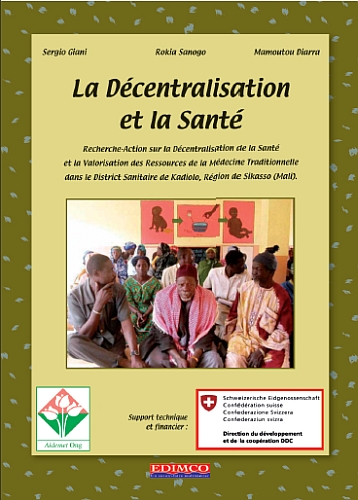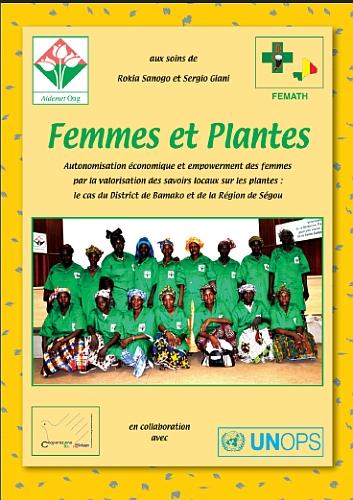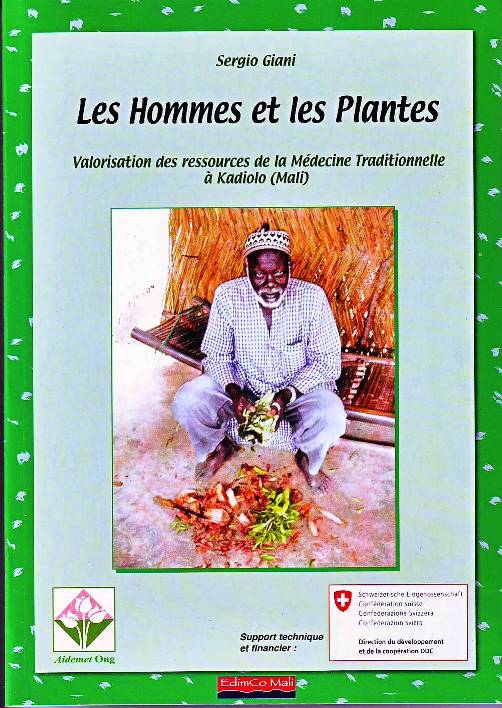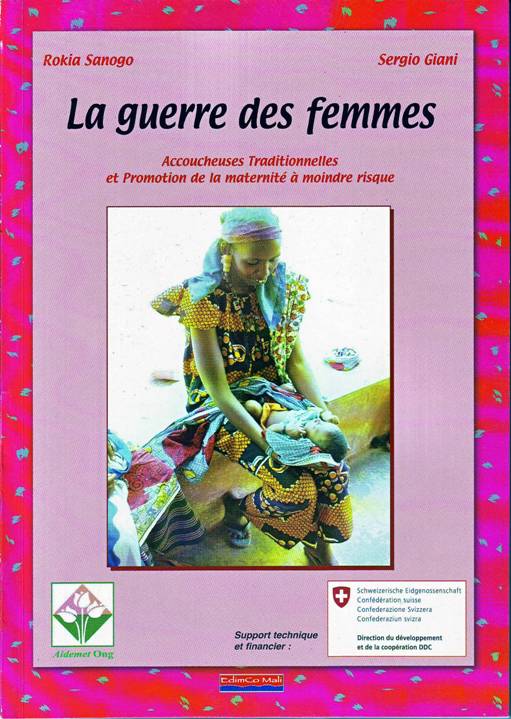 |
|
12:46
Thursday 03 July, 2025
|
|
|
|
|
|
|
|
|
 |
Title: Decentralization and Health
Author: Sergio Giani, Rokia Sanogo and Mamoutou Diarra
Year: 2012 ; Pages: 174
Cost: 20€

|
|
Abstract:
The action research, aimed at the participatory development of policies for community health fair, accessible and efficient, enhancing the resources of traditional medicine, was conducted from January 2005 to March 2010 in the municipalities of Dioumaténé, Kadiolo and Zégoua (District of Kadiolo, Region Sikasso, Mali). It deals with providing a contribution to the discussions and actions that were developed in the context of the application of Decree No. 02-314/P-RM of 14 June 2002. The goal was to influence the design and testing of new policies, standards and procedures for the effective transfer of powers and resources in health to local authorities.
In this context, spaces for dialogue between all local health actors have been opened at the municipal level, to build a decentralized and participatory health planning in a bottom up process, taking into account the specific health problems experienced by the population and all the resources available locally to deal with, including the resources of traditional medicine. The actions also included the testing of decentralized financing systems of health activities.
The research questions asked were: How to integrate in municipal policies all the resources and knowledge in the field of health? How to build bridges between traditional and modern medicine for the benefit of the population? How the local actors can appropriate these new areas of responsibility, taking possession of all levers of action possible? How to ensure the decentralized financing of health cares? Finally, for which municipal health policy?
At the end of a long and sometimes difficult journey, the experiences have shown that the effective decentralization of health is possible... However, it cannot be achieved without each agrees to give up some of his powers and his habits. The decentralization should begin in the minds and hearts of all stakeholders at different levels and must be accompanied by good governance, by transparency of management and by the commitment and the positive civic mobilization of populations.
It 's so that the effective decentralization of health planning, accompanied by local funding of health activities, can be an opportunity to build local health systems more equitable, accessible and culturally appropriate, and for that, more efficient and more effective.
We hope we have given with this book our contribution to the construction of the new Mali, which will come out bigger, we are sure, from the current crisis ... On the other hand, we agree with those who think that decentralization will be, in the future, a real political arena of confrontation, but also of cohesion and participation of local actors and their various civic ambitions. So, it will be possible to take root the participatory democracy in the daily life of grassroots communities, and to place the country away from other crises...
|
| |
 |
Title: Women and Plants
Author: Rokia Sanogo and Sergio Giani
Year: 2013 ; Pages: 42
Cost: 8€

|
|
Abstract:
During the millennia, the people of Africa have used medicinal plants for their health needs. In Mali, these plants are, even today, the first resort for 80% of the population. The activities of harvesting and marketing medicinal plants are carried out mainly by women, who get significant incomes... With urbanization, the demand for medicinal plants has steadily increased, as urban populations have maintained the traditions regarding the use of medicinal plants. Herbalists, who are mostly women, meet this demand. The marketing of medicinal plants contributes so to the survival of populations in urban and suburban slums and villages around the cities.
It is in this context that Aidemet NGO decided, in 2004, to undertake concrete actions to support the herbalists. Many herbalists’ trainings were organized and, since 2007, Aidemet NGO launched a campaign to provide kiosks to herbalists women... The funds were provided by AEMETRA (Italy), the Foundation Hope, through Antenna Technologies (Switzerland) by the French Society of Ethno-pharmacology and private sponsors. Later, the project "Women and Plants" aimed at supporting herbalist women of the Bamako and Segou (Mali) has been carried out since March 2011 to November 2012, with funding from the Italian Cooperation, through the Office of Nations United of Service to Programs. The goal was to improve their working conditions, in order to ensure the quality of the plants sold to the population and to participate in the sustainable management of natural resources. In addition, a self-managed micro-credit fund was put at the disposal of herbalists women. The aim was to give them the opportunity of access to credit at reduced interest rates, for a better operating of their activities, in particular for a fund of trade and for the purchase of packaging materials and instruments of work. Overall, up to now, 55 herbalists, especially women, have benefited of the kiosks.
Our assessment is that women herbalists were able to adapt better than men with the challenges of urbanization. They have proven to have collective intelligence and flexibility to transform their "small" traditional knowledge accumulated over time and passed on from generations of women in a business, at the same time economic and social, present in all the markets of the cities. They have been able to independently organize a network of collection and distribution of medicinal plants, maintaining a strong link between women who remained in the villages and migrant women in the city. They are also able to organize solidarity networks and self-managed forms of financing. They then ensure to the urban women the availability of medicinal plants necessary for health care for themselves, for their children, and for their men. They meet a social demand and provide a local service at very affordable prices, thus generating the resources that are invested, in cities and villages, to support the economy of the family, first to meet the costs of health, nutrition and education of children...
By reading this brochure, you will hear the voices of these women and know their faces and their stories, as well as you will have access to the chronicle and the impact data of the activities we have carried out... We hope, among other things, to be able to mobilize the necessary funds to continue this work, how much useful and passionate.
|
| |
 |
Title: Men and Plants
Author: Dr. Sergio Giani
Year: 2010 ; Pages: 148
Cost: 17 €

|
|
Abstract:
The Program for the Sustainable Management of Natural Resources of Swiss Cooperation, acting in the region of Sikasso, and the Health Program Mali-Switzerland, acting in the districts of Sikasso and Kadiolo, to improve the impact of their activities, decided to conduct a joint action in the field of resources of traditional medicine development, with the support of the Office of Coordination of the Swiss Cooperation in Mali. This book presents the activities that have been carried out in the District of Kadiolo, Sikasso region, from 2001 to 2003.
The preferred methods were an attentive listening, the openness of mind and, above all, the respect for the knowledge and the know-how that the actors of traditional medicine are custodians. We like to define the approach used “the method of the palaver tree”. Do not expect a scholarly work with a muffled language: you will follow the activities on the front line and hear the voices of the protagonists ... The photographic documentation will give a face to some of these voices and place the actions in their social and environmental context. The images of some plants that we could take show the richness of flora in the district of Kadiolo.
Our ambition is to participate in the creation of an African and social vision of the communities health based on the solidarity, in the context of the discussions on the revitalization of primary health care that have developed on the 30th anniversary of Alma Ata. The transfer of powers and resources to local authorities and the implementation of National Policy for Traditional Medicine open in Mali spaces for some synergistic reflections, questions and actions.
|
| |
 |
Title: The War of Women
Author: Prof. Rokia Sanogo and Dr. Sergio Giani
Year: 2009 ; Pages: 116
Cost: 12 €

|
|
Abstract:
The data on maternal and infant mortality remains appalling in Mali, despite the efforts of government and its technical and financial partners: in 2006, according to the data from Health and Demographic Survey, the rate of maternal mortality was 464 deaths per 100,000 live births and the infant mortality rate of 94 ‰.
To cope with this situation, the authors have developed and tested, since 1999, a methodology focused on the involvement of traditional midwives (TM) in the management of obstetric emergencies. The activities were carried out in the sanity district of Kolokani (Koulikoro region), Bandiagara (Mopti region), Kadiolo (Sikasso region), and elsewhere, with the support of various financial and technical partners. At the center of the activities there were some workshops of organization and information of TM.
The goal was to put value on their knowledge and experience in the management of deliveries at the village level, to bring them to take charge of the ordinary child births under the rules of hygiene and to identify and transfer on good time the cases of risk. An analysis of data collected showed that the involvement of TM has facilitated women's access to modern facilities for monitoring pregnancy, childbirth assistance, post-natal control, and vaccination of infants. Some reflections and specific actions were carried out in the fight against female genital mutilations, integrating it in the fight against maternal and infant mortality. The involvement of TM in promoting low-risk maternity could make an important contribution of traditional medicine to achieve the Millennium Goals for Development.
|
| |
|
 |